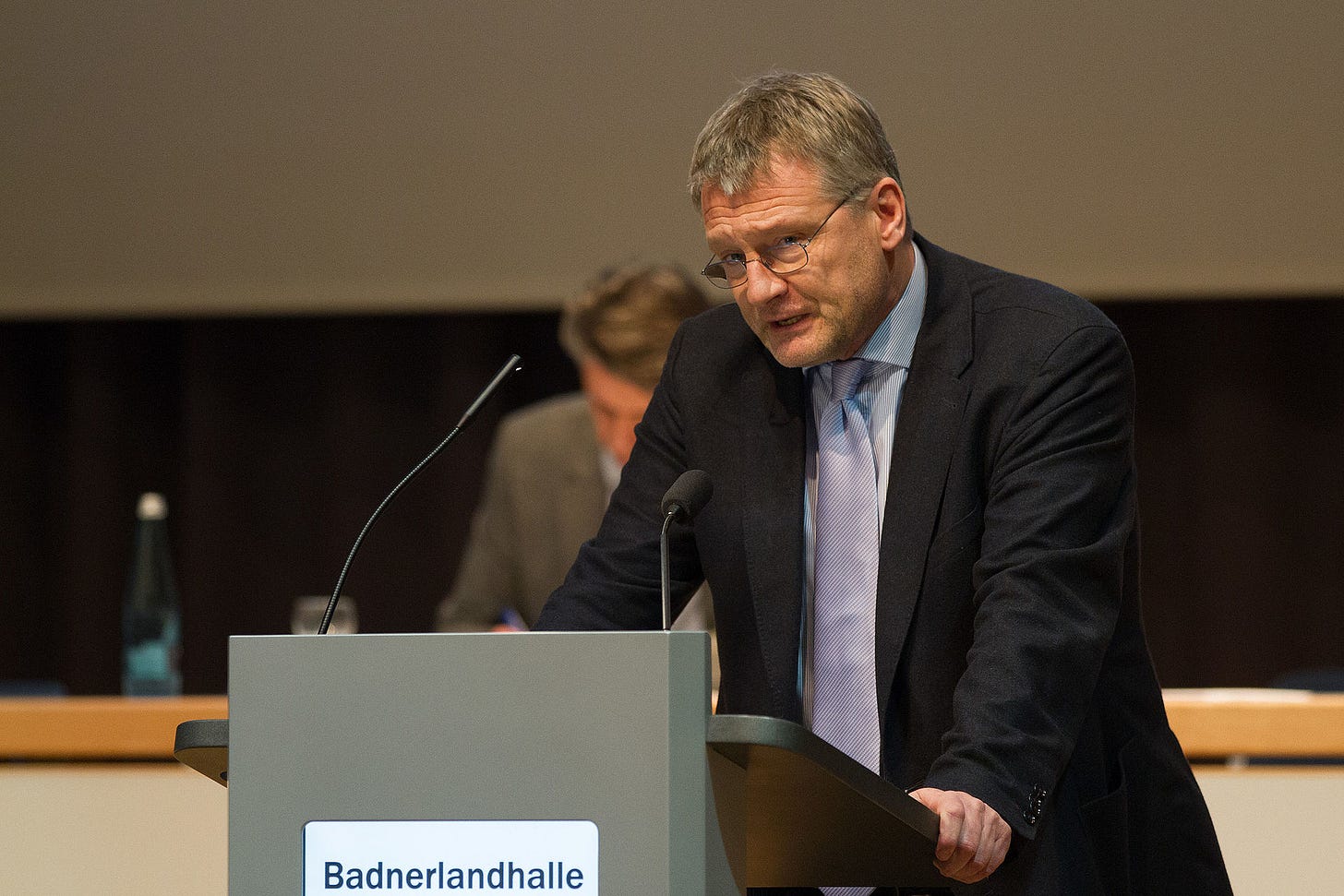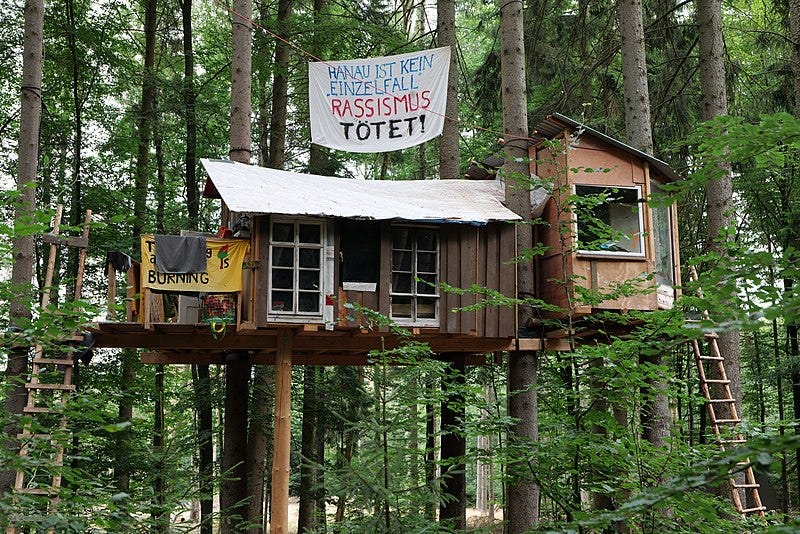Tree huggers, AfD "moderates", and a Bavarian man of mystery
This newsletter is a 4-minute read
Dear Reader,
While the rest of us were busy drinking Glühwein this weekend, the AfD held their in-person party conference, the climate-activists of the Dannenröder forest froze in their tree-huts and Bavaria’s man of mystery continued to prank the press…
Regards,
Jörg & Axel
Forward this newsletter to your friends - we rely on you to grow
1. Meuthen’s “middle ground”

The way Germany’s political parties hold conventions says a lot about them.
Just as the Greens’ online get-together last weekend was supposed to show off their digital prowess, the far-right AfD’s decision to have 600 delegates meet in-person during the pandemic was a less-than-subtle way of sticking two fingers up at the “fear mongering” of the Altparteien.
At the get-together in the town of Kalkar, it didn’t take long for co-leader Jörg Meuthen to start throwing proverbial punches at his adversaries. He criticized both the radicalization and unprofessionalism of his inner-party opponents, then followed with an attack on them for flirting with the anti-lockdown Querdenker (lateral thinker) movement, who he said “struggle to think straight, let along laterally.”
Meuthen demanded that comparisons between the Infektionsschutzgesetz (disease control law) and Hitler’s Ermächtigungsgesetz, or the use of the phrase “Corona-Diktatur”, should end. “We won’t achieve more success by becoming ever more aggressive, ever more coarse, and ever less inhibited," he warned.
Some delegates repsonded with boos and calls for Meuthen to resign. Harmonious it certainly wasn’t. But, as we’ve reported, talk of the party being in terminal decline is premature.
First of all, Meuthen’s supporters were in a clear majority. The extremists have been weakened by the domestic intelligence services’ increased interest in them, as well as by the expulsion of hard-line leader Andreas Kalbitz.
Secondly, the AfD thrives on its unresolved - but not fatal - internal conflicts, which help it appeal to both radical xenophobes and traditional conservatives who’ve left the CDU during the Merkel era. Meuthen is steering his party right where he wants it - far from the murky-brown waters of Björn Höcke but solidly to the right of the CDU. His support of an in-person conference, while simultaneously distancing himself from the Querdenkers, is ample proof of this two-pronged (populist) strategy.
If this helps them to succeed at the ballots next year remains to be seen. Since peaking at close to 18 percent in the autumn of 2018, the AfD has slowly declined in polling to around ten percent.
Like what you’re reading? German current affairs and news straight to your inbox three times a week. Subscribe here to get the Hochhaus newsletter:
2. The battle of Dannenröder forest
Germany’s founding myths are based around battles with the Romans in the depths of the country’s ancient forests. And something about slugging it out in gloomy groves still seems to appeal to the Germanic soul.
Two years ago environmental activists dug in at the Hambacher Forest for a battle of wills with the modern-day version of a Roman legion, energy giant RWE and its army of excavators.
This year the environmentalists have picked the Dannenröder Forest in Hessen as the site for a new insurrection. Parts of the forest are set to be chopped down to make way for an extension of the A49 autobahn. Eco-warriors have set up tree houses, daring the police to cut each of them down individually. Activists accuse police of deliberately chopping the ropes on their constructions, leading to one woman falling from a considerable height and injuring herself.
Activists claim that two disused railway lines could be reopened to provide a greener alternative to the new motorway.
The situation is so tense that locals say it is like living in an occupied zone: they are only allowed to leave their houses if they show an ID card; police helicopters constantly circle overhead.
But the young activists have also come in for criticism over their occasionally violent tactics. Video of clashes with police show them shooting fireworks that set off fires fires in the woods. Do they really care about the trees, or are they just looking for a fight, opponents have asked.
Meanwhile one activist is being held in custody on suspicion of attempted manslaughter after she kneed an officer in the head after he climbed up to her hideout.
Police expect the clearing of the forest to be finished by Christmas. But the symbolic value of the fight might last longer. The transport ministry in Hessen - where the new road is being built - is controlled by none other than the Green party.
While the local Greens insist that autobahn construction is a federal issue and therefore above their pay grade, the activists’ have vented their frustration at Hessen’s transport minister, Tarek Al-Wazir. The heroic defeat in the battle of Dannenröder Forst could still drive recruits to a new environmental party set up by Fridays for Future activists.
Like what you’re reading? German current affairs and news straight to your inbox three times a week. Subscribe here to get the Hochhaus newsletter:
3. What does Markus Söder really want?
The AfD weren’t the only ones conferencing on the first of Advent. The CDU’s youth movement, the Junge Union, held their Deutschlandtag this Sunday. While the grownups in the mother party can neither decide on how to meet nor on whom to choose as chairman, the youngsters have done both: they met up online and promptly backed Friedrich Merz.
But it was neither Merz nor one of his adversaries, Norbert Röttgen or Armin Laschet, who was the headline act at the conference. Joker in the pack, Markus Söder, stole the show.
For over half a year, the Bavarian prime minister has been stringing the press along, refusing to say outright whether he (one of the country’s most popular politicians) wants to become the next Chancellor.
And just as his claim that his “place is in Bavaria” was beginning to sound plausible, Söder chose to once again sow some doubt about whether he secretly yearns to take Mrs Merkel’s place.
Not a member of the CDU but of its Bavarian sister-party, Söder isn’t competing with Messers Merz, Röttgen, and Laschet for the chairmanship. Still, when interviewed at the convention, he couldn’t resist adding to the uncertainty by claiming that "who knows if they will be the only three contenders. Everything seems possible these days..."
He also aired his view that the CDU should hold back as long as possible on making a decision, adding that the chairman and the Chancellor candidate does not have to be the same person.
Instead of tearing their hair out trying to predict what Markus Söder is plotting, perhaps pundits should just flip out Occam’s razor - Mr Söder might not know himself what he really wants...
Who we are:
Jörg Luyken: Journalist based in Berlin since 2014. His work has been published by German and English outlets including der Spiegel, die Welt, the Daily Telegraph and the Times. Formerly in the Middle East.
Axel Bard Bringéus: Started his career as a journalist for the leading Swedish daily Svenska Dagbladet and has spent the last decade in senior roles at Spotify and as a venture capital investor. In Berlin since 2011.




